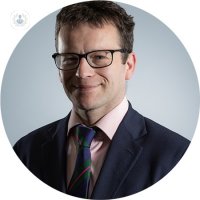How lifestyle habits affect risk varicose veins
Escrito por:Varicose veins are a common problem affecting at least a third of the UK population. They are swollen and enlarged veins, usually occurring on the legs and feet, and can be blue or dark purple and often appear lumpy and bulging. Although some people may have no symptoms other than the visible veins, they can cause aches and pains, heaviness and itching.
Here, Mr Paul Herbert, highly esteemed consultant surgeon who specialises in the treatment of varicose veins, explains how lifestyle factors can influence your chances of developing varicose veins.

What causes varicose veins?
Varicose veins can be largely related to occupation. Anyone standing for long periods, such as salespeople, nurses and teachers are at a greater risk of varicose veins. The reason for this is that gravity makes the muscles in the legs and valves in the veins weaker. Prolonged standing weakens the calf muscles, so it becomes increasingly difficult to pump blood up the legs, giving rise to weak and faulty blood valves.
When valves don’t function properly, this causes blood to leak and flow backwards. Blood then collects in your veins, making them become swollen and enlarged (varicose veins).
Once varicose veins appear, are there lifestyle changes that can improve them?
Regular exercise, walking and reducing body weight can help varicose vein symptoms. Extra body weight puts pressure on your veins, which means they have to work harder to send blood back to the heart. This can put increased pressure on the valves, making them prone to leaking.
These measures won’t get rid of the varicose veins, but they will prevent them from getting worse. Compression stockings can help with aches and pains.
If there’s a family history of varicose veins, are there preventative measures that I can take?
In siblings where both parents have varicose veins, there’s an 80 per cent chance of the child developing varicose veins. If you have a parent with varicose veins, you should be more active, maintain a healthy body weight, and look for any early signs to eliminate the risk of developing varicose veins.
Is surgical treatment a requirement, or is it mostly aesthetic?
Many people have varicose veins removed for aesthetic purposes, however, for those who have symptoms like aches, itching, discomfort and skin changes, treatment is also for relief. Some people have more serious symptoms like varicose eczema or ulcers and bleeding from varicose veins that need definite treatment.
Radiofrequency ablation, for example, is a minimally invasive procedure used for the treatment of varicose veins. This procedure is done under local anaesthetic and the patient can walk home on the same day. Ablation means that heat is applied to damaged tissue, forming scar tissue which then closes the varicose vein. Radiofrequency energy is used as opposed to a laser to heat up the walls of the veins.
Are there pre-surgery lifestyle changes that make surgery more effective?
There are no lifestyle changes as such that make the surgery more effective. Exercise, weight loss and compression stockings can prevent the varicose veins from getting worse, but won’t affect the outcome of the surgery.
It is important to stop any blood thinning medication/anti-coagulants before the surgery. Your doctor will give you a pre-operative assessment before surgery to ensure that the procedure can go ahead.
Are varicose veins guaranteed to return if lifestyle habits aren’t changed?
Varicose veins can recur, so it is recommended to regularly exercise after your surgery. On average, 5-10 per cent of patients need surgery again after ten years.
Will I have permanent scars?
There will be some bruising after the surgery, but this will fade with time. The incisions made into the skin will leave tiny scars but these are nothing in comparison to the appearance of the bulging varicose veins.
How long should I avoid contact sports and intense activities after surgery?
Contact sports should be avoided for at least two weeks post-surgery. Walking, however, is a must and is encouraged immediately after the operation. Any blood thinning medication can be used again after the procedure.
If you would like to get your varicose veins treated, don't hesitate to book an appointment with Mr Paul Herbert via his Top Doctors profile today.


